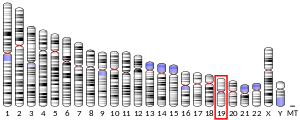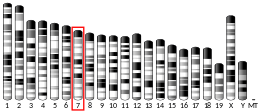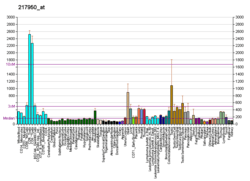NOSIP
Nitric oxide synthase-interacting protein is an enzyme that in humans is encoded by the NOSIP gene.[5][6][7]
References
- GRCh38: Ensembl release 89: ENSG00000142546 - Ensembl, May 2017
- GRCm38: Ensembl release 89: ENSMUSG00000003421 - Ensembl, May 2017
- "Human PubMed Reference:". National Center for Biotechnology Information, U.S. National Library of Medicine.
- "Mouse PubMed Reference:". National Center for Biotechnology Information, U.S. National Library of Medicine.
- Dedio J, Konig P, Wohlfart P, Schroeder C, Kummer W, Muller-Esterl W (Jan 2001). "NOSIP, a novel modulator of endothelial nitric oxide synthase activity". FASEB J. 15 (1): 79–89. doi:10.1096/fj.00-0078com. PMID 11149895.
- Lai CH, Chou CY, Ch'ang LY, Liu CS, Lin W (Aug 2000). "Identification of novel human genes evolutionarily conserved in Caenorhabditis elegans by comparative proteomics". Genome Res. 10 (5): 703–13. doi:10.1101/gr.10.5.703. PMC 310876. PMID 10810093.
- "Entrez Gene: NOSIP nitric oxide synthase interacting protein".
Further reading
- Schleicher M, Brundin F, Gross S, et al. (2005). "Cell cycle-regulated inactivation of endothelial NO synthase through NOSIP-dependent targeting to the cytoskeleton". Mol. Cell. Biol. 25 (18): 8251–8. doi:10.1128/MCB.25.18.8251-8258.2005. PMC 1234313. PMID 16135813.
- Andersen JS, Lam YW, Leung AK, et al. (2005). "Nucleolar proteome dynamics". Nature. 433 (7021): 77–83. doi:10.1038/nature03207. PMID 15635413.
- Dreyer J, Schleicher M, Tappe A, et al. (2005). "Nitric oxide synthase (NOS)-interacting protein interacts with neuronal NOS and regulates its distribution and activity". J. Neurosci. 24 (46): 10454–65. doi:10.1523/JNEUROSCI.2265-04.2004. PMID 15548660.
- Gerhard DS, Wagner L, Feingold EA, et al. (2004). "The status, quality, and expansion of the NIH full-length cDNA project: the Mammalian Gene Collection (MGC)". Genome Res. 14 (10B): 2121–7. doi:10.1101/gr.2596504. PMC 528928. PMID 15489334.
- Ota T, Suzuki Y, Nishikawa T, et al. (2004). "Complete sequencing and characterization of 21,243 full-length human cDNAs". Nat. Genet. 36 (1): 40–5. doi:10.1038/ng1285. PMID 14702039.
- Strausberg RL, Feingold EA, Grouse LH, et al. (2003). "Generation and initial analysis of more than 15,000 full-length human and mouse cDNA sequences". Proc. Natl. Acad. Sci. U.S.A. 99 (26): 16899–903. doi:10.1073/pnas.242603899. PMC 139241. PMID 12477932.
This article is issued from Wikipedia. The text is licensed under Creative Commons - Attribution - Sharealike. Additional terms may apply for the media files.




